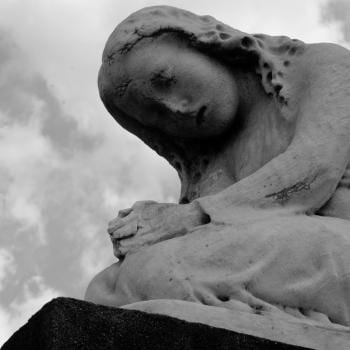Stepping Heavenward, Chapter II, part 2
Just as Katy decides that her mother is being ridiculous and that she had better enjoy her youth as she will be young just once, tragedy strikes.
Katy’s father dies.
I never got a good handle on Katy’s relationship with her father. She mentions him very rarely. After he dies, she notes that right before the accident, her father had called her to him and given her some “pin money.” She says that she knew by this that someone “had been praising me or father would not have seemed so fond of me.”
Did Katy not have a relationship with her father? Was he sort of just a presence who was there, who occasionally complemented her and gave her money? There is no mention of him saying anything to her at all. During the beginning of the book, Katy’s father feels as absent as he feels after he’s gone.
In Little Women, the March girls’ father is gone at war for most of the book. I’m trying to remember what role—if any—he plays in their lives and in their development as individuals after he returns. When I did my re-read, I focused on the beginning, when the girls were Katy’s age, and not so much on later, when they’ve grown and their father is back.
When I turned to google to assist my memory of Mr. March after he returned from the war, this was the first hit I found:
The March girls’ father, like their mother, is essentially perfect. However, he’s also absent, or silently in the background, for most of the novel. For the first half of the book, he’s far away, serving as a chaplain in the Civil War. When he does come back, he proves to be a quiet, thoughtful man who busies himself with thinking about philosophical issues. Although he’s a source of moral guidance for the family – and indeed for the whole community – he’s still only a character sketch, the outline of a person instead of a fully-rounded individual.
To understand why Mr. March is such a vague character, we have to get a little biographical on you. If you’re thinking that maybe Louisa May Alcott had father issues, well, you’re absolutely right.
The article goes on to discus Louisa May Alcott’s father, Bronson Alcott. Unlike Katy’s father, Elizabeth Prentiss’ father died when she was only eight. This may explain the lack of definition surrounding Katy’s father. Prentiss’ father was also a fairly severe Calvinist; scholar Candy Gunter Brown writes that Prentiss, in her own work, developed her theology against that of her father.
Katy’s father suffers a fall while out. He lives only three hours after he is brought home. Katy’s father’s death has a strong impact on her, if partly because of what it means about her family’s stability—and her own mortality.
Katy’s mother does not, however, give her any more leeway.
Nov. 25.-Mother spoke to me very seriously to-day, about controlling myself more. She said she knew this was my first real sorrow, and how hard it was to bear it. But that she was afraid I should become insane some time, if I indulged myself in such passions of grief. And she said, too, that when friends came to see us, full of sympathy and eager to say or do something for our comfort, it was our duty to receive them with as much cheerfulness as possible.
I’ve often wondered how people approached death in the past, when it was so much more common. Nearly every family lost at least one young child, and mixed families were common in an era when men often died in workplace accidents, and women in childbirth—not to mention disease, which could strike either. On what ways—if any—did the closeness of death to their everyday lives make people in the past approach life—and grief—differently?
In this section, however, I see much more in common with today than otherwise. Katy is given to passions of grief, while her mother works hard to hold herself together, in part because she does not want to upset those who visit them.
“It is always a trying task to visit the afflicted,” mother said, “and you make it doubly hard to your friends by putting on a gloomy, forbidding air, and by refusing to talk of your dear father, as if you were resolved to keep your sorrow all to yourself.”
This emphasis on visiting those stricken by death, and on maintaining proper etiquette when receiving such visitors, does feel rather like a period thing. Today, we scarce know what to say to people in such circumstances. (This is not a death in old age, after a long life well lived.) But during a time when death happened more frequently than today, it is almost to be expected that there would be a code of etiquette built around it. And Katy isn’t following it.
Katy is pissed off at the things their visitors are saying. Her responses remind me of Lizzie Bennet’s disposition in Pride and Prejudice, during all of her almost painful visits with insufferable characters. What completely sets Katy off, though, is when one visitor suggests that some people are full of feeling upon a death like this, while others—her mother, namely—are firm. She tells her mother about the exchange later, seething with anger.
“I wish you would ever flare up, mother,” I said.
She smiled again, and said she had nothing to “flare up” about.
“Then I shall do it for you!” I cried. “To hear that namby-pamby woman, who is about as capable of understanding you as an old cat, talking about your being firm! You see what you get by being quiet and patient! People would like you much better if you refused to be comforted, and wore a sad countenance.”
“Dear Katy,” said mother, “it is not my first object in life to make people like me.”
Oh, ouch.
Despite the moralizing present in Katy’s mother’s comment, what’s becoming clear is that the etiquette created around death and grief—and the sense of common experience experiencing death up close over the years would give people—was no balm for grief. Just as today, the condolences of even well-meaning people could add to one’s pain rather than easing it.
This is the first time I’ve actually started to like Katy. Prentiss doesn’t seem to be judging Katy, at least not entirely, for the protectiveness she feels for her mother, or for her anger at passionate visitors who are insensitive.
Nov. 23.-I believe I shall go crazy unless people stop coming here, hurling volleys of texts at mother and at me. When soldiers drop wounded on the battle-field, they are taken up tenderly and carried “to the rear,” which means, I suppose, out of sight and sound. Is anybody mad enough to suppose it will do them any good to hear Scripture quoted sermons launched at them before their open, bleeding wounds are staunched?
When Katy shares her battlefield analogy with her mother, her mother tells her that they must view their friends words as “well-meant attempts … to comfort us” and that “they mean sympathy, however awkwardly they express it.”
This isn’t the only reason this section made me like Katy.
Dec. 14.-Mother keeps saying I spend too much time in brooding over my sorrow. As for her, she seems to live in heaven. Not that she has long prosy talks about it, but little words that she lets drop now and then show where her thoughts are, and where she would like to be.
Oh gosh. Poor woman. You can almost feel her grief in Katy’s words. By my reading, Katy’s mother’s thoughts of heaven aren’t so much a sign of her closeness to God as they are a symbol of the depths of her grief.
Katy, though, is unimpressed by heaven.
For my part, I am not eager at all. I can’t make myself feel that it will be nice to sit in rows, all the time singing, fond as I am of music. And when I say to myself, “Of course we shall not always sit in rows singing,” then I fancy a multitude of shadowy, phantom-like beings, dressed in white, moving to and fro in golden streets, doing nothing in particular, and having a dreary time, without anything to look forward to.
Oh. Gosh. I feel this. I remember wondering keenly about what heaven would be like, and noting to myself with some concern that singing and golden streets didn’t seem particularly interesting. There is a strange sort of cross-historical camaraderie in knowing that I was not the first teen to wonder whether I would be bored in heaven. (Yes yes, I know this is fiction. Still, the book is semi-autobiographical, and this section is evidence that this line of questions existed.)
Katy puts her thoughts to her mother:
I told mother so. She said earnestly, and yet in her sweetest, tenderest way,
“Oh, my darling Katy! What you need is such a living, personal love to Christ as shall make the thought of being where He is so delightful as to fill your mind with that single thought!”
What is “personal love to Christ?”
That’s … helpful. I remember hearing something similar as a child, and being similarly not impressed. I ended up concluding that if God loved us enough to send his son to die for our sins, he would surely make sure we weren’t bored in heaven. I remember thinking vaguely that making us like constantly singing his praises would not bee enough, as that would be a personality transplant.
But then, I was not a child who enjoyed singing. I very much did not.
Katy writes out some of her passions of grief in her diary:
Oh, dear, dear! Why need my father have been snatched away from me, when so many other girls have theirs spared to them? He loved me so! He indulged me so much! He was so proud of me! What have I done that I should have this dreadful thing happen to me? I shall never be as happy as I was before. Now I shall always be expecting trouble. Yes, I dare say mother will go next. Why shouldn’t I brood over this sorrow? I like to brood over it; I like to think how wretched I am; I like to have long, furious fits of crying, lying on my face on the bed.
It’s hard to write sympathy without it sounding sarcastic. I type “poor thing” and then read over what I’ve written and it sounds flippant.
Regardless, it’s interesting that Katy seems to get something out of throwing herself entirely into her grief—I’m sure there are physiological treatises that would help explain Katy’s feelings, which seem confusing even to herself.
Jan. I, 1832.-People talk a great deal about the blessed effects of sorrow. But I do not see any good it has done me to lose my dear father, and as to mother she was good enough before.
Katy never blames her father’s death on God, which is somewhat curious. Instead, she contents herself with giving the side eye to anyone who claims that sorrow can have “blessed effects.” She does not describe these statements in any detail, so it’s unclear whether it’s something akin to modern evangelicals’ argument that sorrow and loss can make one grow closer to God, or whether it’s something quite different. Either way, she’s not buying it.
Katy writes in her diary that they have to move to a smaller house “on an out-of-the-way street,” and that she will have to go to a different school. She says her mother hopes, by practicing economy, to “carry James through college.”
We are going to leave our pleasant home, where all of us children were born, and move into a house in an out-of-the-way street. By selling this, and renting a smaller one, mother hopes, with economy, to carry James through college. And I must go to Miss Higgins’ school because it is less expensive than Mr. Stone’s. Miss Higgins, indeed! I never could bear her! A few months ago, how I should have cried and stormed at the idea of her school. But the great sorrow swallows up the little trial.
When I studied creative writing when I was a teenager, I remember character development being very important. You didn’t want your character to start the story and end the story without having changed in some way. Over the course of Stepping Heavenward, Katy does change. This is the first place you start to see it. Katy’s father’s death has helped her put other things in proportion.
Katy writes in her diary that she gets along better with her brother now—she writes that he is “the very pleasantest, dearest fellow in the world!” When he comes home for a sort of winter break, he and Katy are constantly together.
We study and sing together and now and then, when we forget that dear father has gone, we are as full of fun as ever. If it is so nice to have a brother, what must it be to have a sister!
Yet despite these changes, Katy repeats that she cannot seem to make herself love God—or take pleasure in prayer—however much she tries.
January 15 arrives, and a much soberer Katy turns 17, thinking deep thoughts about death and loss. And yet, Katy is also starting to create a new normal.
[T]hough at times the remembrance of our loss overwhelms me, my natural elasticity soon makes me rise above and forget it. And I am absorbed with these school-days, that come one after another, in such quick succession that I am all the time running to keep up with them. And as long as I do that I forget that death has crossed our threshold, and may do it again. But to night I feel very sad, and as if I would give almost any thing to live in a world where nothing painful could happen. Somehow mother’s pale face haunts and reproaches me. I believe I will go to bed and to sleep as quickly as possible, and forget everything.
Katy has found that if she keeps herself busy, she can forget that she has lost her father, at least for a time. I’m reminded of the discussion, in my review series of Love Comes Softly, of Marty’s fierce need to be constantly working in the wake of her young husband’s death. Katy, though, has no need to look for make-work.
I have a Patreon! Please support my writing!















